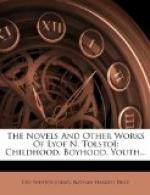“Yet what does it matter,” I thought, “that we are well off and they are not? Why should that necessitate a separation? Why should we not share in common what we possess?” Yet, I had a feeling that I could not talk to Katenka on the subject, since a certain practical instinct, opposed to all logical reasoning, warned me that, right though she possibly was, I should do wrong to tell her so.
“It is impossible that you should leave us. How could we ever live apart?”
“Yet what else is there to be done? Certainly I do not want to do it; yet, if it has to be done, I know what my plan in life will be.”
“Yes, to become an actress! How absurd!” I exclaimed (for I knew that to enter that profession had always been her favourite dream).
“Oh no. I only used to say that when I was a little girl.”
“Well, then? What?”
“To go into a convent and live there. Then I could walk out in a black dress and velvet cap!” cried Katenka.
Has it ever befallen you, my readers, to become suddenly aware that your conception of things has altered—as though every object in life had unexpectedly turned a side towards you of which you had hitherto remained unaware? Such a species of moral change occurred, as regards myself, during this journey, and therefore from it I date the beginning of my boyhood. For the first time in my life, I then envisaged the idea that we—i.e. our family—were not the only persons in the world; that not every conceivable interest was centred in ourselves; and that there existed numbers of people who had nothing in common with us, cared nothing for us, and even knew nothing of our existence. No doubt I had known all this before—only I had not known it then as I knew it now; I had never properly felt or understood it.
Thought merges into conviction through paths of its own, as well as, sometimes, with great suddenness and by methods wholly different from those which have brought other intellects to the same conclusion. For me the conversation with Katenka—striking deeply as it did, and forcing me to reflect on her future position—constituted such a path. As I gazed at the towns and villages through which we passed, and in each house of which lived at least one family like our own, as well as at the women and children who stared with curiosity at our carriages and then became lost to sight for ever, and the peasants and workmen who did not even look at us, much less make us any obeisance, the question arose for the first time in my thoughts, “Whom else do they care for if not for us?” And this question was followed by others, such as, “To what end do they live?” “How do they educate their children?” “Do they teach their children and let them play? What are their names?” and so forth.
IV. IN MOSCOW
From the time of our arrival in Moscow, the change in my conception of objects, of persons, and of my connection with them became increasingly perceptible. When at my first meeting with Grandmamma, I saw her thin, wrinkled face and faded eyes, the mingled respect and fear with which she had hitherto inspired me gave place to compassion, and when, laying her cheek against Lubotshka’s head, she sobbed as though she saw before her the corpse of her beloved daughter, my compassion grew to love.




